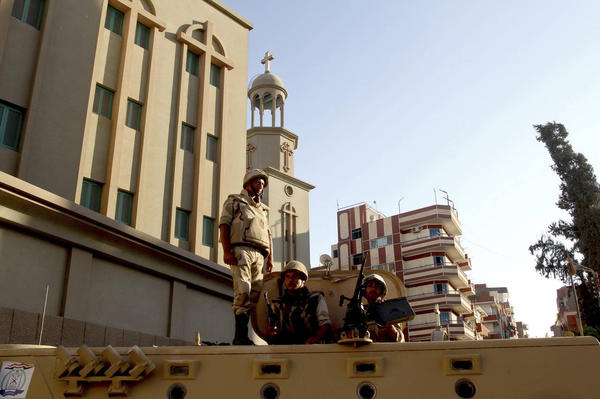The abductions come as Egypt’s designated Prime Minister Ibrahim Mahlab is finalizing lineup of new cabinet due to swear in, following the election of President Abdel-Fattah el-Sissi, the former defense minister and military chief.
El-Sissi’s ouster last year of Islamist President Mohammed Morsi — and the subsequent crackdown on Morsi’s Muslim Brotherhood — garnered him strong support among Egypt’s Coptic Christian minority, who make up about 10 percent of Egypt’s population.
Still, Christians have continued to be targeted by Islamic militants either as retaliation for their support to el-Sissi or for the sake of hefty ransoms. Coptic organizations have reported dozens of abductions since Morsi’s July 3 ouster — most in the south, where large concentrations of Christians are located near strongholds of Islamic groups.
In the northern Sinai — where about 10,000 Copts live — the military has been waging an offensive against Islamic militants who have escalated attacks and suicide bombings against police and military since Morsi’s removal.
Security and church officials said Monday that in the north Sinai city of el-Arish masked gunmen snatched Wadie Ramses, a prominent surgeon who runs the city’s first private-owned hospital around midnight Saturday after they opened fire on his vehicle, wounding him in the leg. Hours later, they demanded a ransom of 10 million Egyptian pounds ($1.4 million).
On Monday, a Christian merchant named Gamal Shenouda was abducted near his house in el-Arish in daytime, but no ransom demand had been made yet. Security officials said that authorities are investigating, officials said.
A church official based in el-Arish said that the abductions have caused a state of panic among Christians in northern Sinai, with some considering leaving the area. Last year, dozens of families abandoned their homes in the nearby Rafah town near borders with Gaza Strip, after attacks by extremists on Christians there.
All officials spoke on condition of anonymity because of the security concerns.
Meanwhile, the Interior Ministry said security forces clashed with Muslim Brotherhood supporters in Cairo’s May 15 suburb in fighting that killed a policeman. The violence began when police set up a checkpoint to stop a group of Brotherhood followers suspected of burning police cars and other violence, the ministry said.
Egypt has waged a heavy crackdown on Morsi’s supporters for the past 11 months, killing hundreds and jailing thousands. Egyptian authorities branded the Brotherhood a terrorist organization last year. The group denies it uses violence and has kept up its protests against the post-Morsi government.
Authorities stepped up their confiscation of the Brotherhood’s assets on Sunday, when police seized a number of supermarket chains in the capital owned by a deputy Brotherhood leader and a wealthy businessman who allegedly supports the group.
Meanwhile, state TV reported that the swearing of new cabinet in will take place on Tuesday and that it will not include the Information Ministry, the government body that for decades has overseen state media, keeping them to a close government line supporting official policies and rallying support for the leadership.
The move is in line with the newly adopted constitution, which calls for an “independent institution” to regulate media and press.
After the 2011 ouster of autocrat Hosni Mubarak, activists and free media advocates called for abolishing the ministry and state media. The transitional military council that took power after Mubarak’s removal initially agreed to the move, but then reinstated the ministry.
Egypt’s new parliament — which is to be elected within months— has a mandate to pass legislation that will regulate the work of the new media body.

















